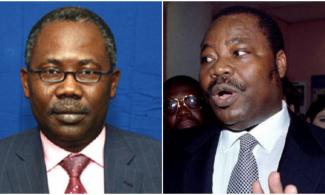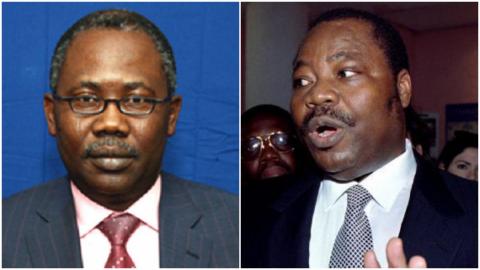
In just one day, 8 October 2012, 30 separate deposits of 1 million naira in cash were paid into the account. The deposits were all under the ceiling that would trigger money-laundering inquiries.
Italian judges hypothesise that the benefit received by Bello Adoke may have constituted a perfectly legal payment for legal services provided by the former Attorney General to Dan Etete, the principal of Malabu, when Adoke was in private practice.
Italian judges at the Milan court said former Minister of Justice, Bello Adoke, one of those accused of fraud in the OPL 245 scam, also referred to as the Malabu scandal benefited from the million dollars scam.

Adoke’s London solicitors Gromyko Amedu had earlier stated in court that "Our client has never acted as counsel to Chief Dan Etete and the two have never had a client/solicitor relationship”.
The lawyers have also stated that Adoke vigorously denied receiving any benefit from OPL 245.
According to OPL245 Papers, Adoke, who is on trial in Nigeria along with Abubakar for OPL 245-related corruption offences, does not dispute that he took out a mortgage to purchase a house from Abubakar, or that Abubakar repaid the loan when Adoke was unable to service the mortgage. Both he and Abubakar deny any wrongdoing.
In his autobiography titled Burden of Service, Adoke explains that Abubakar, described by Adoke as “a builder and a developer whom I had been acquainted with for a long time”, offered to sell him a house for N500 million (equivalent to €2.425 Million euros at the time). The price being beyond what he could afford from his salary, Adoke sought and obtained a mortgage of N300 million from Unity Bank. According to Adoke, the payment was “made directly to the developer, not me”.
[story_link align="left"]99482[/story_link]
Adoke states that he later found himself unable to service the mortgage, causing the Central Bank of Nigeria (CBN) to take an interest in the loan as Adoke was a Politically Exposed Person.
When Abubakar “got wind of the interest of the CBN in the property”, he “wanted to take it back”. He contacted Adoke “offering to return the money paid to him by the bank”. Adoke then suggested Abubakar “should approach the bank and offer to pay back the loan”.
Adoke also asked Abubakar “to retrieve the title documents which he gave to the bank upon receipt of their N300 million”.
Adoke said he did not know for sure what happened next. He writes, “I have no inkling of how [Abubakar] paid or how much he paid. I have no idea if he made the payment in dollars, neither do I know if a bureau de change was involved. I merely recall that both the developer and the MD of the bank confirmed to me that the loan had been repaid and that the title documents had been returned. I asked that the bank account be closed. That ended the matter as far as I was concerned.”
Adoke’s London solicitors have stated that having paid off the mortgage and obtained the registration documents, Abubakar subsequently sold the property to the Central Bank of Nigeria. This Day Live reports that the house has been the property of the CBN since 2013.
[story_link align="left"]84668[/story_link]
Adoke denies that he has ever taken a bribe.
“I did not collect any bribe from anybody for the five years that I was a Minister. I repeat: I never took a kobo, a cent or a dollar bribe from anybody throughout my tenure as Minister.”
Documents accepted as evidence by the Milan Court confirm that Aliyu Abubakar offered to sell Adoke a property described as “Plot 3271, Cadastral Zone A06, Maitama, Abuja” for 500 million naira.
The offer letter, which was sent on 5 October 2011, was made by Carlin International, a company owned by Abubakar. It was signed by Bashir Adewuni as “property manager” for Carlin International.
[story_link align="left"]102039[/story_link]
The court documents also confirm that, on 29 December 2011, Adoke applied to Unity Bank for a mortgage of N300 million to purchase “a house on Vanetta Street, off Maitama”. The mortgage was approved on 7 February 2012.
However, the evidence presented to the Milan court files raise a number of red flags over the mortgage transaction:
In sworn evidence to the Milan Court, Bashir Adewuni testified that he was not aware of any sale of a property from Carlin to Adoke and that he did not know and had never met Adoke. When shown a Carlin Document which named him as the Property Manager, he claimed the signature was not his.
Whereas Adoke asserts that the mortgage payment was “made directly to the developer, not me”, Unity Bank documents record that the money paid to the developer came from Adoke’s account. A bank slip records that the payment was made “by order of Mr Mohammed Bello Adoke”.
A legal search conducted by Brenda Oluwade and Associates on behalf of Unity Bank records that the land was not registered to Carlin at the time that Adoke paid the company for the property. The registered owner was another company, City Hopper Properties and Investment Company Limited.
In his application for the mortgage loan, Adoke affirms that he had already advanced N200 million in equity to the vendor. An internal Unity Bank memo also states that an “equity contribution of the sum of N200 million was already advanced to the vendor (Carlin International Limited)” and that proof had been received by the Bank’s Credit Administration Department.
However, in subsequent press interviews and his autobiography, Adoke states that he was unable to raise the N200 million: “I had hoped to raise the N200 million from the sale of a piece of land I owned in Abuja. However, it turned out that I could not secure a buyer for that price.”
The loan was approved by Unity Bank without any precise details of the property being purchased: the property is described as a “house at Venetta Street, Maitama, Abuja” – no plot number or house number is given – despite the property being the collateral for the loan.
Although internal Unity Bank memos initially state that all the necessary documentation for the loan had been obtained, bank staff later warn that the account had “not been regularised” and that “we do not have any document to support the facility as contained in the conveyance letter”.
Although Adoke states that he was unaware how the mortgage loan was repaid or whether a bureau de change was involved, his bank statements clearly record numerous cash payments from bureaux de change. In just one day, 8 October 2012, 30 separate deposits of 1 million naira in cash were paid into the account. The deposits were all under the ceiling that would trigger money-laundering inquiries.
The Milan case file does not contain any record in the documentation from Unity Bank of any deeds being “returned” to Abubakar or of the Central Bank of Nigeria making inquiries about the loan.
Although Adoke’s lawyers have stated that the property was sold by Abubakar to the Central Bank of Nigeria, the Abuja Geographic Information System confirmed to the Economic and Financial Crimes Commission in 2106 that the property was still registered to City Hoppers under a Certificate of Occupancy that had been in place since 1995.